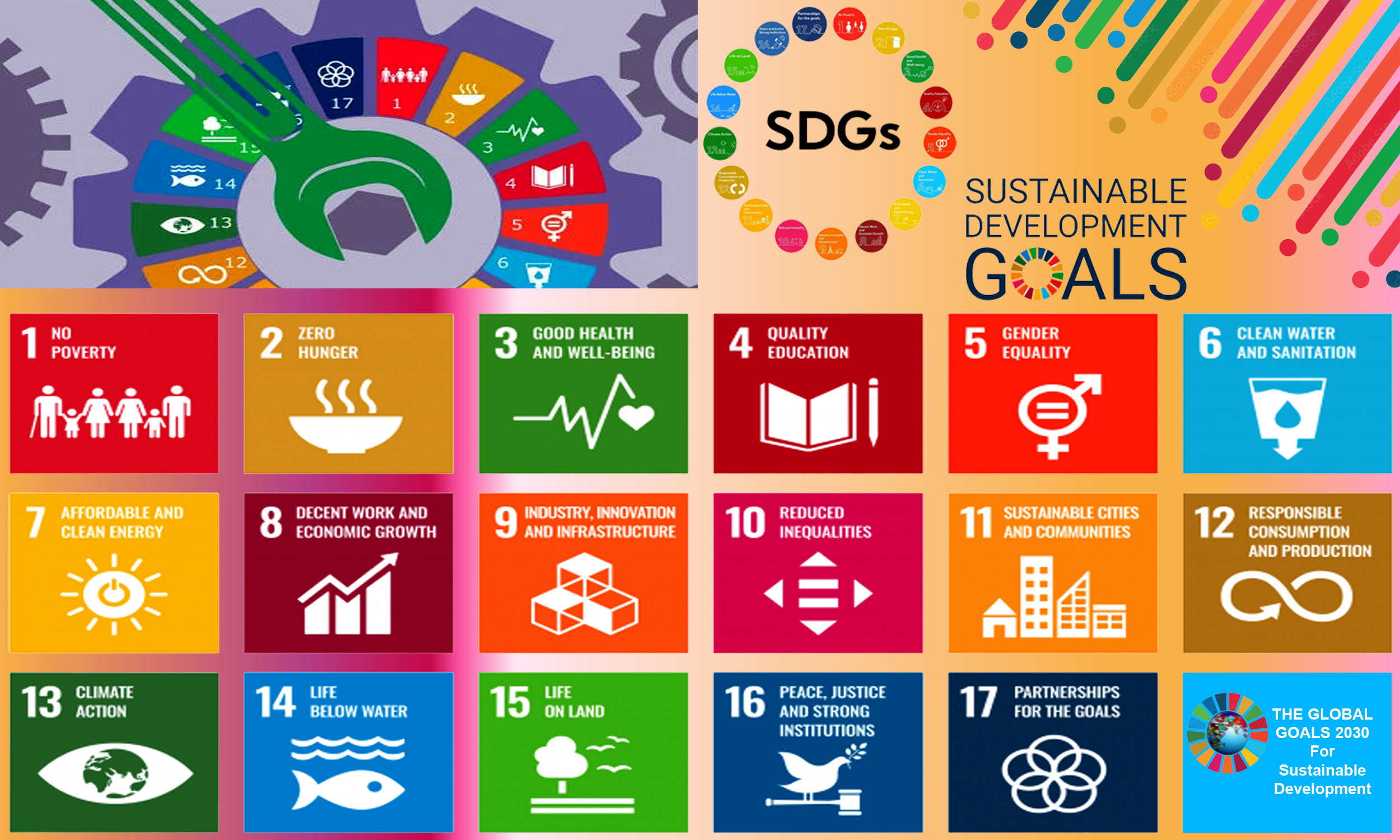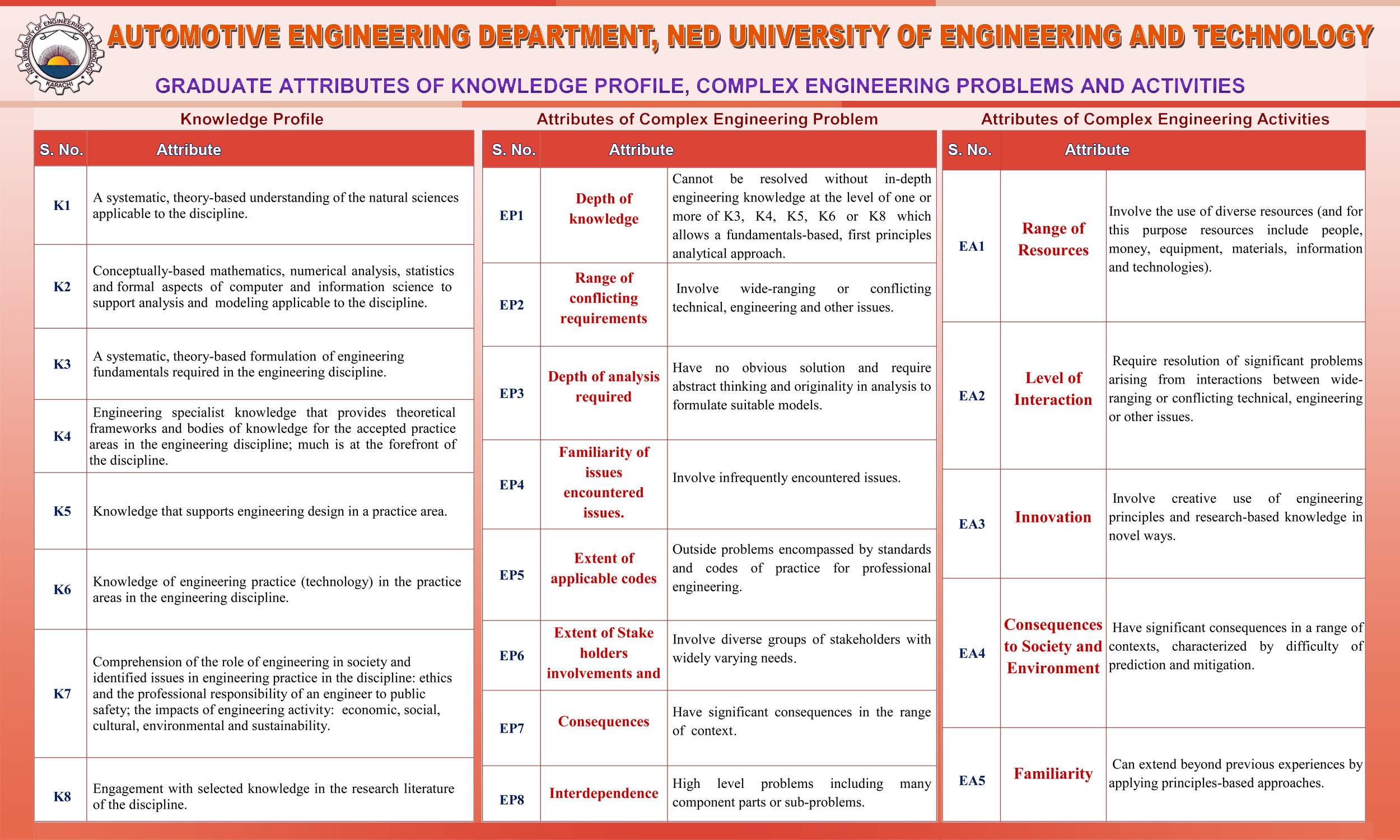OUTCOME BASED EDUCATION
Vision of NED University of Engineering & Technology
Be a leader in enabling Pakistan's social and economic transformation.
Mission of NED University of Engineering & Technology
Acquire education and research excellence in engineering and allied disciplines to produce leadership and enabling application of knowledge and skills for the benefit of the society with integrity and wisdom.
Mission of the Department
To develop automotive engineer capable of applying knowledge and skills for solving the problems of society in general and automotive industry in particular keeping higher values and professional ethics.
Program Educational Objectives (PEO)
Graduates are able to:
PEO-1 Apply knowledge, skills and attitude to solve complex engineering problems of industry.
PEO-2 Demonstrate management and communication skills complimenting technical competence.
PEO-3 Use and improve upon contemporary and emerging technologies while focusing on lean and green methodologies.
PEO-4 Demonstrate professional, societal, ethical values and commitment towards continued professional development.
Following are the Program Learning Outcomes (PLOs) adopted in Automotive Engineering Program as recommended by PEC in their Manual of Accreditation 2014.
PLO-1 Engineering Knowledge: An ability to apply knowledge of mathematics, science, engineering fundamentals and an engineering specialization to the
solution of complex engineering problems.
PLO-2 Problem Analysis: An ability to identify, formulate, research literature, and analyze complex engineering problems reaching substantiated conclusions using first principles of mathematics, natural sciences and engineering sciences.
PLO-3 Design/Development of Solutions: An ability to design solutions for complex engineering problems and design systems, components or processes that meet specified needs with appropriate consideration for public health and safety, cultural, societal, and environmental considerations .
PLO-4 Investigation: An ability to investigate complex engineering problems in a methodical way including literature survey, design and conduct of experiments, analysis and interpretation of experimental data, and synthesis of information to derive valid conclusions.
PLO-5 Modern Tool Usage: An ability to create, select and apply appropriate techniques, resources, and modern engineering and IT tools, including prediction and modeling, to complex engineering activities, with an understanding of the limitations.
PLO-6 The Engineer and Society: An ability to apply reasoning informed by contextual knowledge to assess societal, health, safety, legal and cultural issues and the responsibilities relevant to professional engineering practice and solution to complex engineering problems.
PLO-7 Environment and Sustainability: An ability to understand the impact of professional engineering solutions in societal and environmental contexts and
demonstrate knowledge of and need for sustainable development.
PLO-8 Ethics: Apply ethical principles and commit to professional ethics and responsibilities and norms of engineering practice.
PLO-9 Individual and Team Work: An ability to work effectively, as an individual or in a team, on multifaceted and /or multidisciplinary settings.
PLO-10 Communication: An ability to communicate effectively, orally as well as in writing, on complex engineering activities with the engineering community and with society at large, such as being able to comprehend and write effective reports and design documentation, make effective presentations, and give and receive clear instructions.
PLO-11 Project Management: An ability to demonstrate management skills and apply engineering principles to one’s own work, as a member and/or leader in a team, to manage projects in a multidisciplinary environment.
PLO-12 Lifelong Learning: An ability to recognize importance of, and pursue lifelong learning in the broader context of innovation and technological developments
Mapping of PEO to PLO |
| PLO | PEO | ||||||
|
PEO-1 Apply knowledge, skills and attitude to solve complex engineering problems of industry. |
|||||||
| PEO-1 | PEO-2 | PEO-3 | PEO-4 | ||||
| 1 | Engineering Knowledge. | P | |||||
| 2 | Problem Analysis. | P | |||||
| 3. | Design / Development of Solutions. | P | |||||
| 4. | Investigation. | P | |||||
| 5. | Modern Tool Usage. | P | |||||
| 6. | The Engineer and Society. | P | |||||
| 7. | Environment and Sustainability. | P | |||||
| 8. | Ethics. | P | |||||
| 9. | Individual and Team Work. | P | |||||
| 10 | Communication. | P | |||||
| 11. | Project Management. | P | |||||
| 12. | Lifelong Learning. | P | |||||
Overall Continuous Quality Improvement (CQI) Process
|
Mapping of PEOs to PLOsUniversity & Department Vision and Mission and Program Learning OutcomesATTRIBUTES
|
SDGs GOALS

PLO-CLO Course wise and Taxonomy Mapping of “FALL” Semester Courses
